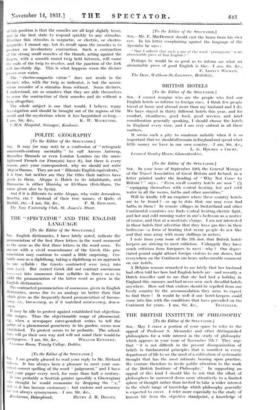THE -"SPECTATOR" AND THE ENGLISH LANGUAGE [To the Editor of
the SPECTATOR.] SI IL -English dictionaries, I have lately noted, indicate the pronunciation of the first three letters in the word nouthenal as the same as the first three letters in the word noun. To anyone with a vivid remembrance of the Greek this pro- nunciation may continue to sound a little surprising. Cer- tainly nous as a diphthong, taking a diphthong as an approach to one syllable : the Greeks contracted 91994 (,do;) into nous (pois). But correct Greek did not contract noonmenon (.°011,0,) into noumenon (four syllables in three) so as to yield the pronunciation of the latter word as given in the English dictionaries.
The contracted pronunciation of noumenon, given in English dictionaries, seems due to an analogy no better than that ithich gives us the frequently-heard pronunciation of bureau- cracy, i.e., bur-o-cracy, as if it matched arist-o-cracy, dem-o- crony.
It may be idle to protest against established but objection- able usages. Thus the objectionable usage of phenomenal, c-g., when a newspaper correspondent writes to tell the public of a phenomenal gooseberry in his garden, seems now established. To protest seems to be pedantic. The school- boys will go their own way and will not mind their would-be


































 Previous page
Previous page